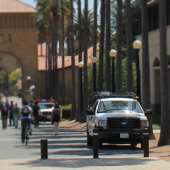- ‹ previous
- 117 of 176
- next ›
8.2.1 University Events

Last updated on:
09/01/2002
Formerly Known As Policy Number:
82.1
This Guide Memo summarizes policy on University events held on University property. More detailed information is located at the Office of Special Events & Protocol.
Applicability:
This policy applies to all University faculty, staff and students.
Jump To:
1. Definition
A University event is an event, other than academic classes scheduled as part of the curriculum, that is held in a University building or outdoor space on the University campus. All such events that take place on the Stanford campus are considered University events. A University event must also be sponsored by an officially recognized Stanford department or organization and must be in keeping with the University's mission (i.e., the creation, preservation, and dissemination of knowledge).
2. Types of University Events
NOTE: Some types of events may overlap. If you have questions, please contact the Stanford Events Office at: (650) 723-2551. Events must be consistent with the University's mission and must relate directly to the educational goals of the sponsoring department or organization.
- Academic-related Event
An academic-related activity that is NOT included in the established curriculum of quarterly classes listed at Stanford (e.g., special guest lecture series, panel discussion) - Administrative Event
An administrative event, including a daily, weekly or occasional gathering and/or meeting by an official department or registered group that would not be open to the public, (e.g., a department faculty meeting, gathering of department staff, a student group board of directors meeting). The focus of these meetings is generally to discuss department or group business and/or do administrative planning. It may include professional training. These gatherings may also be social in nature (e.g., department luncheon, picnic, reception or holiday party). - High Impact Event
An event that is large in scope, usually with an expected attendance of 500 people or more. Such events generally require coordination and review by several University departments and organizations (e.g., Stanford Events, Public Safety and Risk Management) - Campus Community Event
An event open only to Stanford students, faculty and staff. This may also qualify as a High Impact, Invitation-only, Administrative or Academic-related event. - Public Event
An event open to Stanford students, faculty, staff, and members of the public. A Public Event can also be considered an Academic-related Event and/or a High Impact Event. - Invitation-only Event
An event open only to invited guests (e.g., University donor or alumni events, administrative or special-program events).
3. Scheduling and Approval Process
The process of scheduling and seeking approval for University events must be started in advance. Those approving and planning events must follow all Stanford policies listed in this Guide Memo and at the Stanford Events website.
a. Organizations that May Request Use of Facilities
Organizations that may request use of University indoor and outdoor spaces and facilities for University events are:
- Academic departments
- Administrative offices
- The Associated Students of Stanford University (ASSU)
- Voluntary student organizations that are registered with the University through the Office of Student Activities (OSA)
- Student living groups
- Any other organizations officially recognized by the President's Office
b. Most Facilities Usage Approvals
University events at all locations except those noted in section 3.c below must be scheduled and approved in advance by the Registrar's Scheduling Office, which will determine the availability of spaces and facilities and coordinate any necessary event approvals with the Stanford Events Director of Public Events.
c. Facilities Usage Requiring Other Approvals
To use the following facilities/spaces, follow the local approval process:
- Administrative or Academic-related Events with a Department—Those department Administrative or Academic-related Events utilizing the already-established building space of that sponsoring department (e.g., GSB administrative staff having a weekly planning meeting in one of the Business School's classrooms, a special History Department panel discussion utilizing a History Department classroom) should follow the department's internal process.
- Cantor Arts Center—Contact the Center directly to discuss use of interior and exterior museum spaces and docent tour arrangements for events.
- DAPER Facilities—For an official athletic event sponsored by the Department of Athletics, Physical Education and Recreation (DAPER) (e.g., football, basketball, baseball season games or special DAPER sponsored tournaments) contact DAPER and follow its approval process.
- Student Residences Events—Events conducted in student residences by students residing in those residences are subject to the policies and procedures put forth by the Office of Student Activities (OSA).
- Summer Conferences—The procedure for initiating requests for summer conference use of facilities is described in Guide Memo 8.2.2: Conferences.
- (Applicable if the event is to be held between the conclusion of spring quarter and prior to the beginning of the following fall quarter.)
- Tresidder Memorial Union—For the use of space located in the Tresidder Memorial Union buildingfor conferences and special events for the campus community (and, in some cases, outside organizations), contact Tresidder Meeting Services.
- Schwab Residential Center—Contact the Center directly for event reservations.
- Frances C. Arrillaga Alumni Center—See the Alumni Center website for information.
4. Other Information Sources
- The Stanford Events Office—Provides information about University event planning, policies, procedures, and resources.
- Registrar's Scheduling Office—Provides overview and application forms regarding reservation procedures and other relevant non-academic scheduling details for the use of indoor and outdoor campus space.
- Office of Student Activities (OSA)—Provides information on policies and procedures for individual students and student groups wishing to plan an event; see http://www.stanford.edu/dept/OSA/.
- Iris & B. Gerald Cantor Center for Visual Arts
- DAPER—For information on Facilities, Operations & Events, call (650) 723-1949.
- Tresidder Memorial Union—Provides information, resources and contacts; see the Tresidder Meeting Services website.
- Schwab Residential Center
- Frances C. Arrillaga Alumni Center


